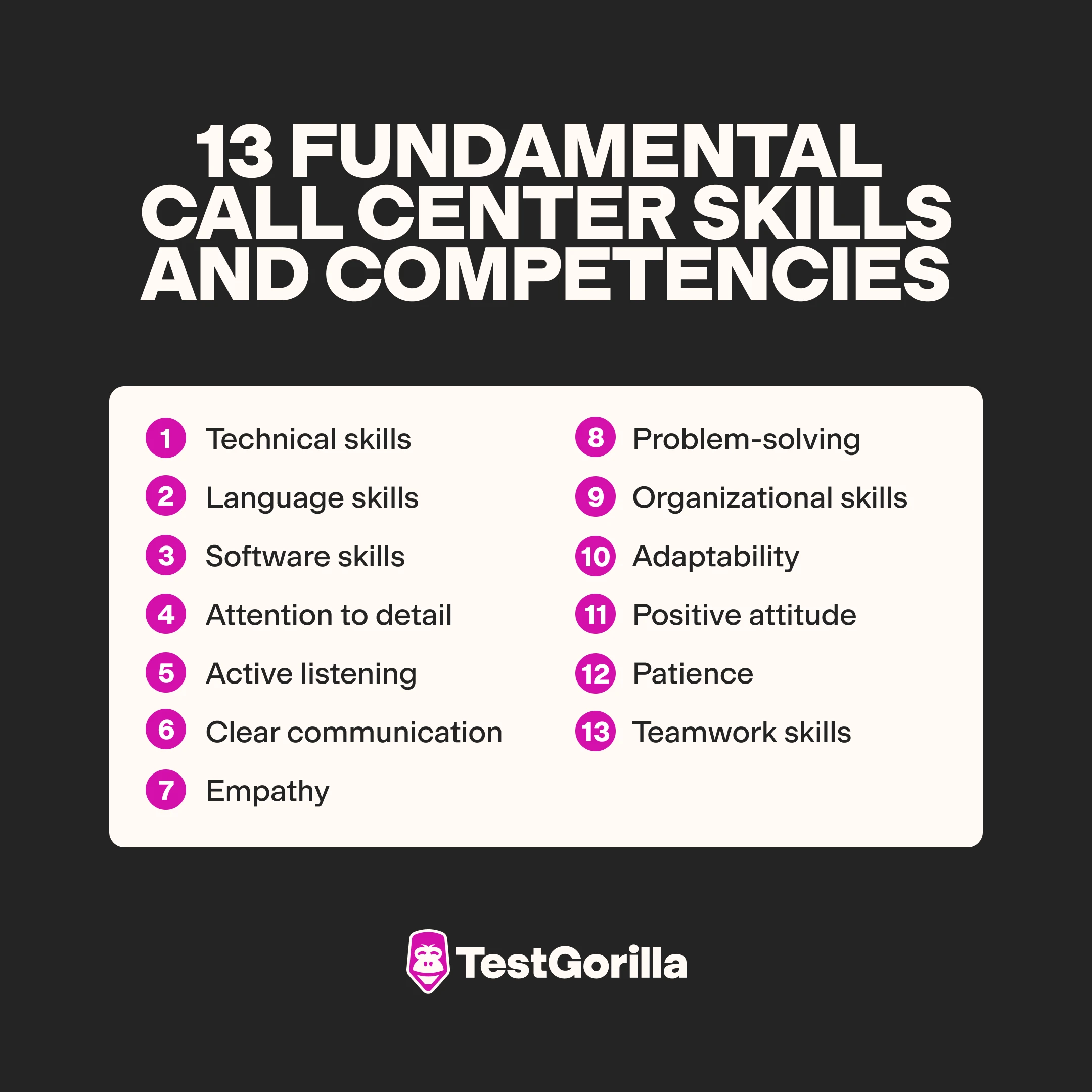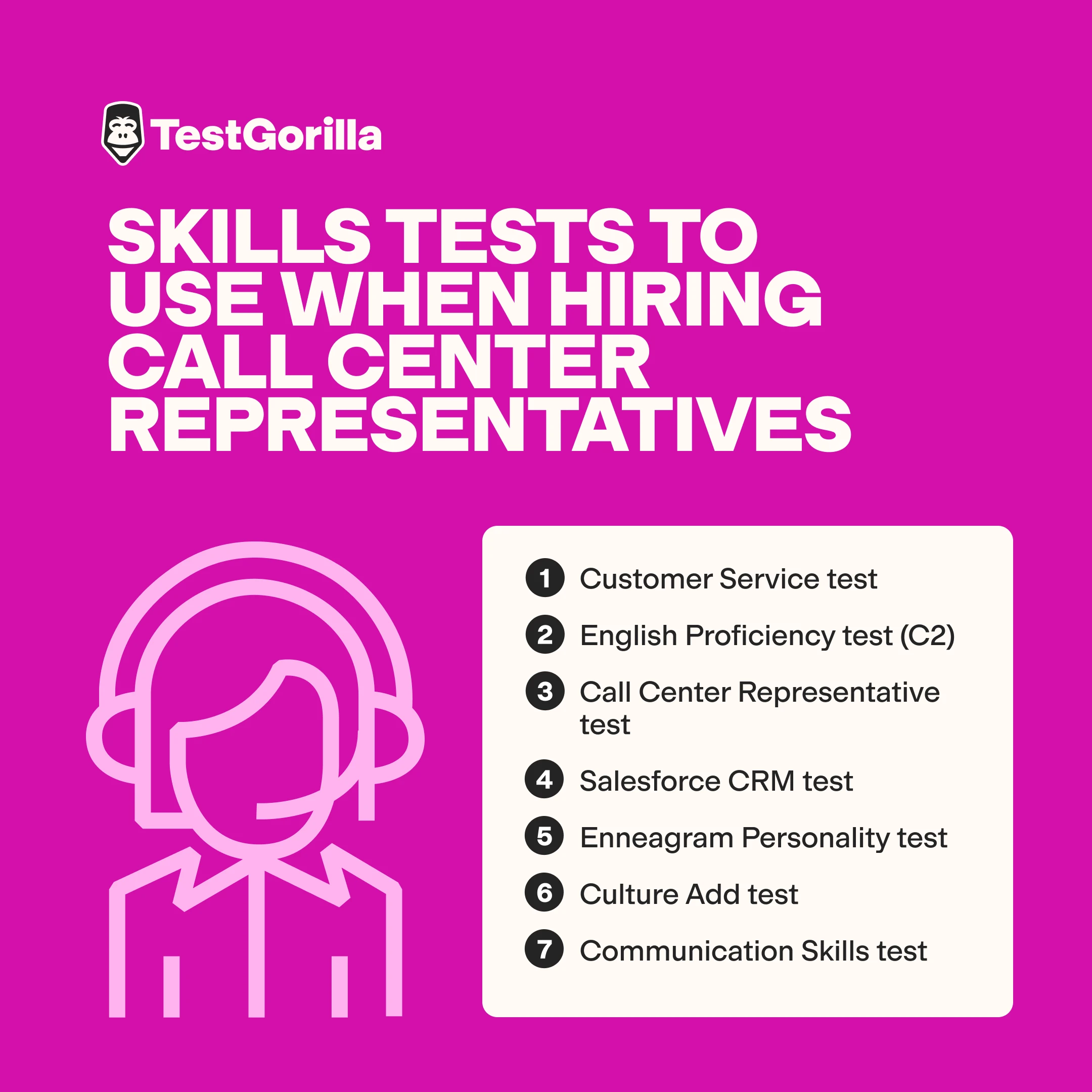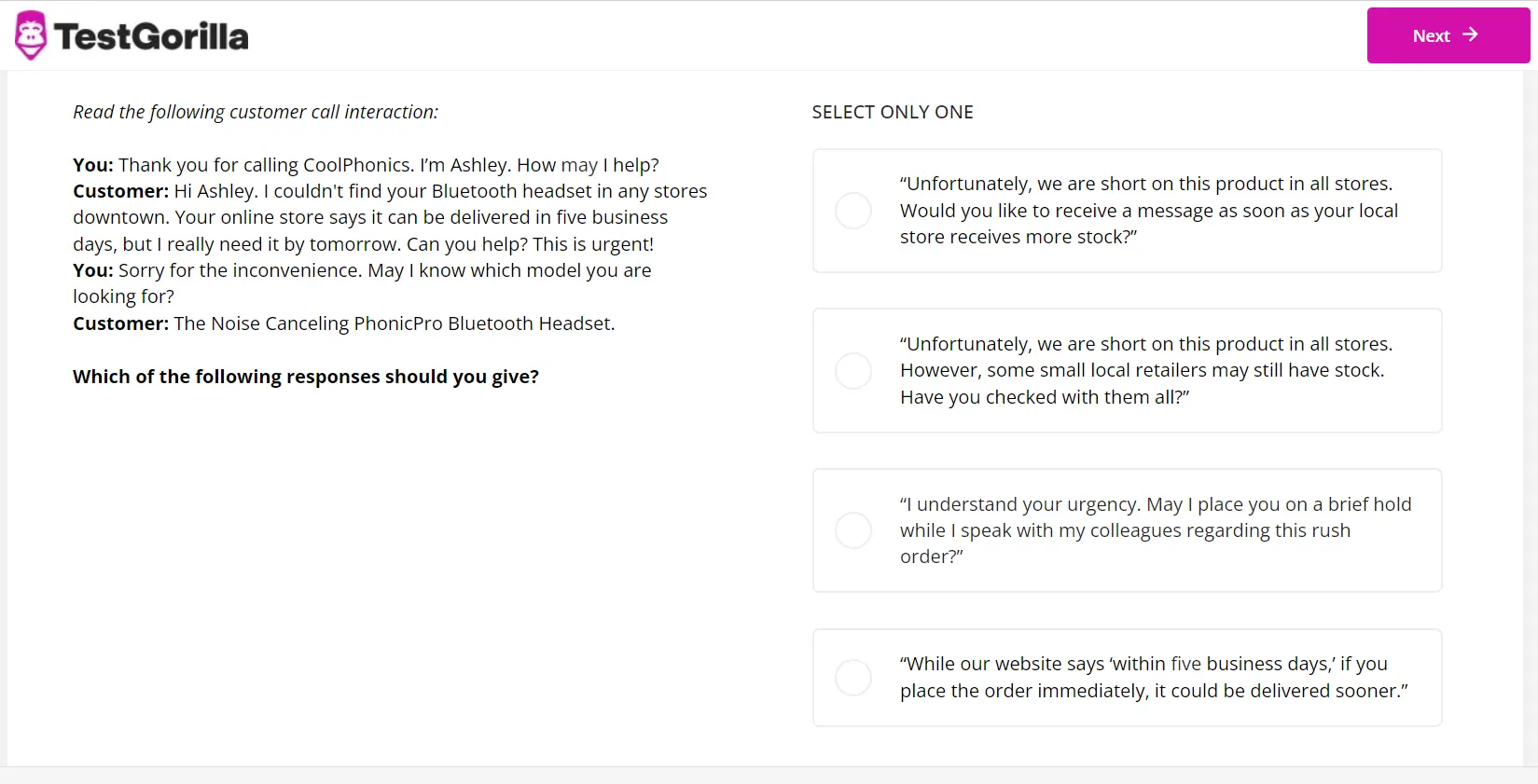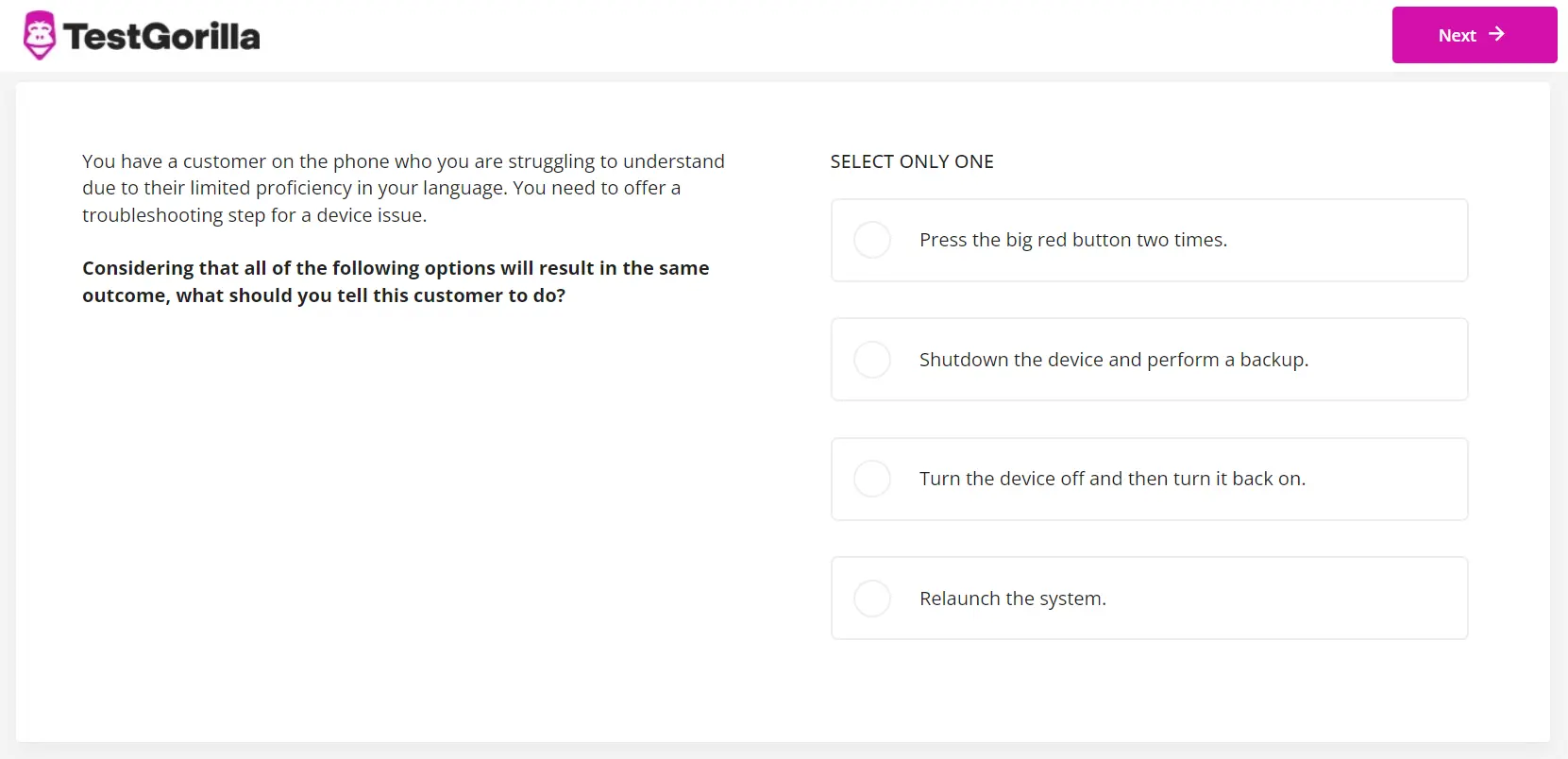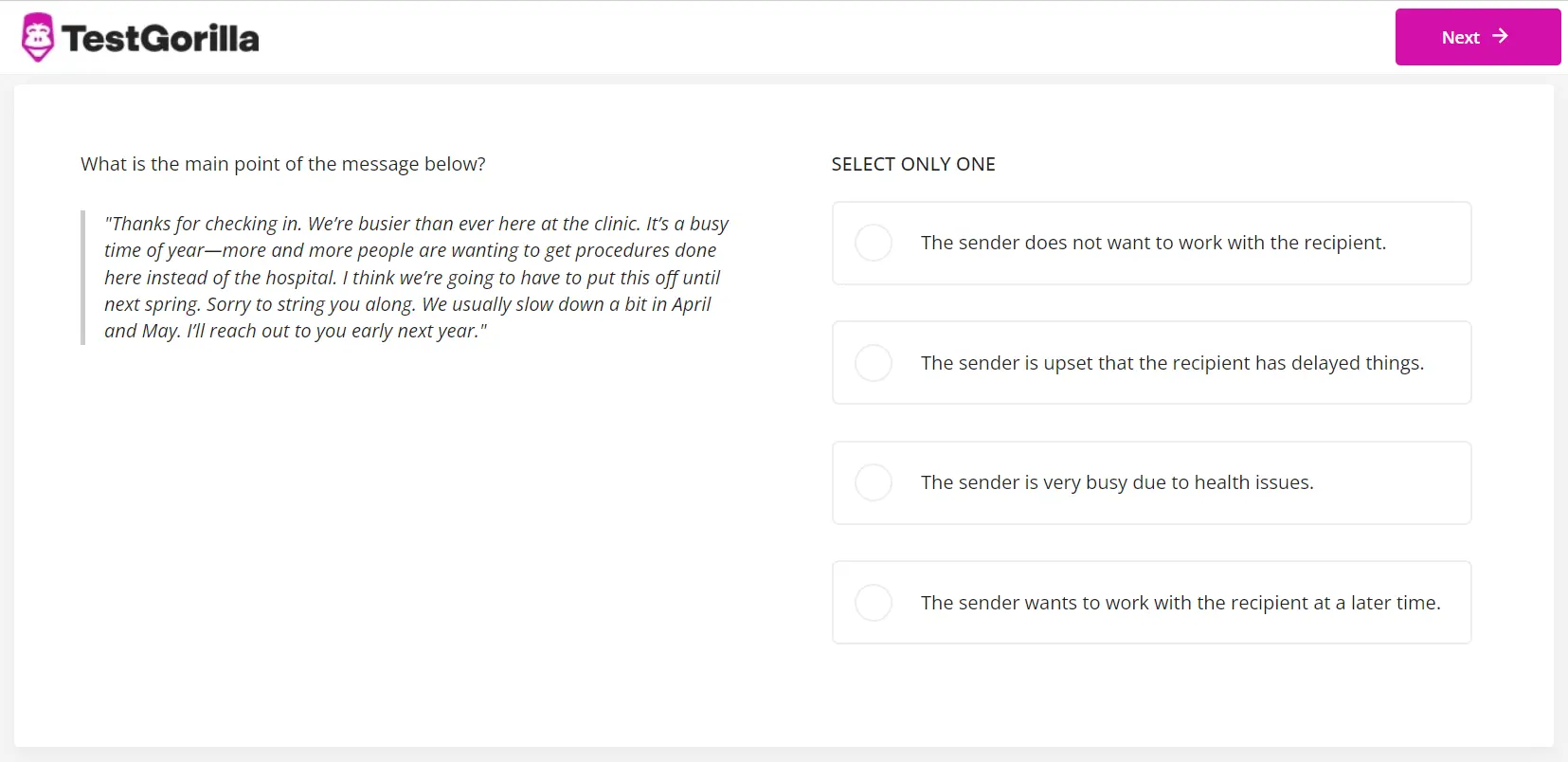Assess crucial call center skills with TestGorilla
Poor customer service can lead to customer frustration and damage your brand reputation. When a customer calls for help and receives unprofessional or unhelpful responses, it drives them away.
That’s why agents require a range of call center skills, from empathetic listening to problem-solving.
The best way to evaluate call center representative skills is to forget about resumes and use talent assessments.
In this article, we share useful tips and strategies to help you identify, measure, and improve crucial call center customer service skills.
Table of contents
- 13 fundamental call center skills and competencies
- How to assess call center representative skills and traits: Use skills tests
- Summary: The 13 key call center rep skills and how to test for them
- How to develop call center job skills
- Use TestGorilla to find an agent with the right call center rep skills
- Contact center skills FAQs
13 fundamental call center skills and competencies
Understanding the most important call center job skills and competencies ensures that the agents you hire can effectively handle customer interactions and improve overall service quality.
1. Technical skills
Tech proficiency is one of the most important skills for call center representatives because it helps them solve customer issues quickly. That’s important because 90% of consumers consider issue resolution the most important part of customer service.
A unique ability to prioritize tasks and multitask can help agents assist more customers without compromising service quality. In addition, having a solid understanding of general technical concepts and troubleshooting can lead to faster resolutions and increased customer satisfaction.
2. Language skills
Language skills directly impact how clear and effective agents communicate with customers, understand customer queries, provide accurate information, and convey professionalism.
You can assess these call center rep skills with:
Language proficiency tests
Role-playing scenarios
Listening comprehension tests
Writing assessments
Verbal structured interviews
3. Software skills
Call center representatives must possess strong software skills to navigate various tools and platforms and manage data to improve service delivery. Specific software skills include proficiency in CRM systems, data entry software, and communication tools.
As technology evolves, agents with strong software skills can learn and adapt to new tools and systems, ensuring they remain effective in their roles.
You can test for these skills with:
Practical software tests
Task-based assessments
Simulated phone call scenarios
Technical interviews
4. Attention to detail
Following procedures and protocols precisely is important for maintaining consistency and quality in customer service. Attention to detail helps prevent errors that lead to customer dissatisfaction, escalations, and operational inefficiencies.
Detailed-oriented agents are better at identifying and addressing the root causes of customer issues, leading to faster and more effective resolutions.
5. Active listening
Active listening is the practice of fully concentrating, understanding, and responding thoughtfully to what the customer is saying. It includes not cutting off the speaker, validating their feelings, asking clarifying questions, and restating their concerns to ensure accurate understanding.
When callers feel genuinely heard, they are more likely to have positive interactions, which leads to satisfied customers.
A good call center assessment test can help find agents who listen and adapt their approaches to specific customer needs.
6. Clear communication
Good call center agents must be able to explain complex processes quickly because 90% of customers expect clear, speedy communication.
When a call center agent provides clear, timely information, callers get the answers they need without confusion.
With good communication, agents resolve issues faster, reducing average handling time and boosting efficiency. This translates into business cost savings and a more streamlined customer experience.
7. Empathy
When contact center agents display genuine empathy, they form an emotional bond with customers. This connection can turn one-time customers into lifelong fans.
Considering that two-thirds of companies compete on customer experience, a customer support team with empathy could be your golden ticket to massive growth and profitability.
Empathetic agents can navigate different emotional responses, turning potentially negative interactions into positive experiences. They understand and advocate for others’ needs, which helps customers feel heard and valued.
A proper call center assessment test can help you identify empathetic agents who can truly understand the customer’s perspective.
8. Problem-solving
Problem-solving skills help call center agents to come up with solutions for various problems their clients encounter daily.
Customers often come to call centers with different issues that require creative problem-solving. A call center agent with these abilities can navigate customer problems and find the best solution.
You can test for this skill with talent assessments or some problem-solving questions for adults.
9. Organizational skills
Call centers are often staffed leanly, so agents must be able to multitask and prioritize tasks quickly. Organizational skills and time management help customer service representatives succeed in an environment with multiple customer queries, inbound and outbound calls, and CRM updates.
Highly organized agents can significantly contribute to a team’s productivity.
Key organizational skills include:
Organizing your workspace
Keeping track of your schedule
Prioritizing tasks based on their importance or urgency
10. Adaptability
Adaptability is the ability to navigate change and uncertainty with ease and resilience. It helps customer service agents tailor their approach to provide personalized solutions for every individual.
Agents with these call center soft skills can think on their feet and adjust their responses based on the situation, ensuring a great customer experience.
Agents with strong adaptability skills can quickly learn new systems, processes, and your company’s products. This ensures they stay up-to-date with the latest changes and continue to provide high-quality service.
11. Positive attitude
An optimistic approach is contagious and boosts productivity. In fact, researchers from the University of Warwick say happy employees are 12% more productive.
Agents with a friendly, can-do attitude can boost customer loyalty, turning an unhappy caller into a repeat customer. They are more likely to create great customer experience and approach challenges with a solution-oriented mindset, resulting in more efficient and effective resolutions for customers.
The ability to see the glass as half-full can also create a more enjoyable collaborative work environment, boosting team morale.
12. Patience
All call center agents encounter unhappy customers. When they have patience, they can address these situations calmly and professionally, leading to positive outcomes.
Patience is a soft skill that can improve performance and overall job satisfaction in fast-paced, high-stress environments (with high burnout), such as call centers.
The proper tests for patience in call center candidate screening should focus on how they:
Practice active listening skills and engage in mindful communication
Use stress management techniques
Reflect on past experiences to learn from challenges
Develop emotional intelligence to understand customer emotions better
13. Teamwork skills
Being a great team player is necessary because call center operators operate as teams, each member having a specific role in providing customer care services. Agents can share tips, tricks, and best practices with colleagues to keep everyone’s call center skill set sharp.
Teamwork creates a positive work environment, which leads to higher job satisfaction and better performance.
People with good teamwork skills usually listen carefully, respect others’ opinions and ideas, and are willing to share information with others when needed. That’s why you should look for these skills and traits when hiring call center agents.
How to assess call center representative skills and traits: Use skills tests
Assessing call center agent skills and traits is crucial for building a high-performing team.
The easiest way to build a replicable, unbiased hiring funnel for great call center talent is to forget about resumes and use a pre-employment screening platform like TestGorilla. Below, we have collated seven tests that are perfect for uncovering top call center agents.
We suggest you build a multi-measure assessment made up of five skill tests, so feel free to pick and choose from our shortlist of tests based on your recruiting goals.
1. Customer Service test
The Customer Service test helps you assess your candidates’ unique hard and soft call center skills. It evaluates an applicant’s practical knowledge of customer service and skills like communication, problem-solving, empathy, and adaptability.
Candidates answer multiple-choice questions covering real-life scenarios and theoretical knowledge, ensuring a thorough evaluation. You get an accurate and detailed report of each candidate, showing their strengths and areas that need improvement.
This test enables you to test applicants on various topics, from understanding customer needs to handling difficult situations. You can assess multiple candidates quickly and even identify candidates with call center supervisor skills.
For more questions from this test, visit the Customer Service test preview.
2. English Proficiency test (C2)
The English Proficiency test (C2) helps organizations confirm their candidates have high-level English skills.
The test is divided into sections, each focusing on a specific language skill. These sections include reading comprehension, grammar, vocabulary, idiomatic expressions, and written communication.
Using the English Proficiency test (C2) has several benefits:
Saves time and resources spent on manual screening and interviewing processes
Helps organizations quickly and easily identify top candidates who meet their language requirements
Ensures you’re hiring call center employees who can communicate effectively and professionally with customers
3. Call Center Representative test
The Call Center Representative test evaluates the essential skills required for a successful call center environment, including problem-solving, communication, multitasking, and customer service.
With a combination of situational judgment tests, multiple-choice questions, and interactive simulations, the call center assessment test provides a well-rounded evaluation of a candidate’s capabilities.
You can tailor this test to ensure it aligns with your unique needs and requirements.
4. Salesforce CRM test
The Salesforce CRM test evaluates Salesforce CRM skills, helping call center agencies identify the best candidates for their teams. Hiring candidates with strong Salesforce knowledge increases the likelihood of efficient customer interactions and problem-solving.
The Salesforce CRM test is divided into multiple domains, each focusing on a specific aspect of the Salesforce platform. These include customization, development, data management, and reporting.
Using this test for assessing talent can help:
Objectively measure candidates’ Salesforce knowledge
Reduce bias and ensure fair evaluation
Eliminate unskilled candidates
Focus on those who have the right skills for call centers
Save time and resources by streamlining hiring processes
Note: We also offer tests for Zoho CRM and HubSpot CRM if your organization happens to use one of these tools instead.
5. Enneagram Personality test
The Enneagram Personality test is a widely recognized personality assessment tool that helps hiring managers evaluate the personality traits of their candidates and how these traits affect their ability to work cohesively within a team.
Understanding a candidate’s personality type helps employers gain insights into their motivations, communication styles, and potential strengths and weaknesses.
The Enneagram Personality test consists of multiple-choice questions to identify a candidate’s dominant personality among the nine types.
Understanding different personality traits helps employers create a diverse and balanced team. This test presents an opportunity to build teams that complement each member’s unique strengths for a more collaborative work environment.
6. Culture Add test
The Culture Add test identifies candidates with the necessary technical skills and the right mindset, attitudes, and behaviors that align with a company’s core values and culture.
This test uses various question formats, including multiple-choice, true or false, and situational judgment scenarios. These questions assess a candidate’s understanding of the company’s cultural principles, communication style, and problem-solving approach.
The results determine how well a candidate can integrate into the organization, collaborate with colleagues, and add unique values and perspectives.
Use talent assessments to hire candidates with great call center skills
Skills tests are the best way to ensure your candidates have the necessary hard and soft skills to thrive in a call center environment. Sign up for free to start hiring better talent.
7. Communication Skills test
The Communication Skills test evaluates a candidate’s ability to convey information clearly, listen actively, and engage professionally with customers.
The Communication Skills test assesses various aspects of communication through situational judgment questions that simulate real-world scenarios. Candidates are evaluated on their ability to:
Understand customer inquiries and respond accurately
Provide clear and concise explanations
Engage with customers courteously and professionally even in challenging situations
The best insights on HR and recruitment, delivered to your inbox.
Biweekly updates. No spam. Unsubscribe any time.
Summary: The 13 key call center rep skills and how to test for them
We covered quite a bit, so here’s a summary table for your convenience:
Call center representative skills | Summary | How to test |
Technical skills | Ability to navigate multiple software systems and multitask efficiently | Salesforce CRM test |
Software skills | Proficiency with call center software and CRM systems | Salesforce CRM test |
Language skills | Proficiency in language for clear and professional communication | English Proficiency test (C2) |
Communication | Ability to explain complex processes quickly and clearly | Communication Skills test |
Attention to detail | Precision in data entry and adherence to protocols | Call Center Representative test |
Organizational skills | Managing tasks efficiently and maintaining a well-organized workspace | Call Center Representative test |
Active listening | Fully understanding customer concerns and offering accurate solutions | Customer Service test, Communication Skills test |
Empathy | Forming an emotional bond with customers and understanding their perspectives | Customer Service test |
Problem-solving | Tackling unexpected challenges and finding the best solutions | Customer Service test, Problem-solving interview questions |
Adaptability | Navigating change and uncertainty with ease and resilience | Customer Service test |
Patience | Addressing difficult situations calmly and professionally | Customer Service test |
Positive attitude | Maintaining an optimistic outlook and a can-do attitude | Enneagram Personality test |
Teamwork | Collaborating effectively with colleagues and customers | Enneagram Personality test, Culture Add test |
All of the tests mentioned in this table are available in our test library.
How to develop call center job skills
HR professionals can create strategies to develop call center manager skills for their team members. These initiatives can improve employee performance, customer satisfaction, and retention.
Here are some strategies to improve call center customer service skills:
Recommendation | Description |
Implement continuous training sessions | Conduct regular workshops, webinars, and online courses focused on technical and soft contact center skills |
Encourage mentorship and coaching | Pair less experienced agents with seasoned mentors for hands-on guidance and feedback |
Practice with simulations | Use role-playing exercises to enhance problem-solving, communication, and empathy skills |
Provide constructive feedback | Conduct regular performance reviews to identify skill gaps for tailored development plans |
Use e-learning and gamification | Make learning more engaging and interactive |
Support self-improvement | Encourage agents to set personal goals and develop skills relevant to their roles |
Use TestGorilla to find an agent with the right call center rep skills
Your team needs the appropriate skills for call centers to deliver exceptional customer service and maintain operational efficiency. With the proper hard skills and call center soft skills, you can build a team that excels in handling customer interactions and resolving issues effectively.
TestGorilla’s skills tests help you quickly find the best agents for your call center by measuring the candidate’s skills, cognitive skills, culture add, and personality type.
Sign up for a Free forever plan to start using our free tests, including the effective Communication Skills test.
Take a product tour to learn more about talent assessments and how to use them in your hiring process.
Book a live demo to explore how to customize talent assessments to identify candidates with the best call center skills.
Contact center skills FAQs
Do you still have questions about the call center skill set of your employees? Take a look at some of the most common questions and answers about call center job skills.
What is a call center skills assessment test?
A call center skills assessment evaluates the skills and abilities of candidates applying to be call center agents. The tests help you find those who can perform their tasks efficiently and effectively to deliver top-notch customer service. They typically measure a range of skills related to the job, such as computer knowledge, communication, active listening, and transcription.
What are some important call center agent skills?
Technical skills for efficient use of call center software and tools
Organizational abilities to keep tasks and information well-structured
Strong communication to ensure clear and effective information exchange
Problem-solving for quick resolution of issues
Empathy to build emotional connections with customers
What are the basic computer skills in a call center?
Basic computer skills in a call center include proficiency in using Windows operating systems and the Microsoft Office suite, particularly Excel for data management and reporting. Agents must also be proficient in CRM software, email, and instant messaging tools. Additionally, strong call center skills like typing and accurate data entry can help you be more productive.
What are the basic soft skills of customer service?
Communication to clearly convey information
Active listening to fully understand needs and concerns
Patience for maintaining calmness and professionalism under pressure
Problem-solving to find effective solutions to issues
Adaptability to adjust to changing situations and needs
Organization skills to efficiently handle multiple tasks and interactions
Teamwork to collaborate effectively with colleagues
Attention to detail to ensure accuracy in communication and data entry
You've scrolled this far
Why not try TestGorilla for free, and see what happens when you put skills first.



